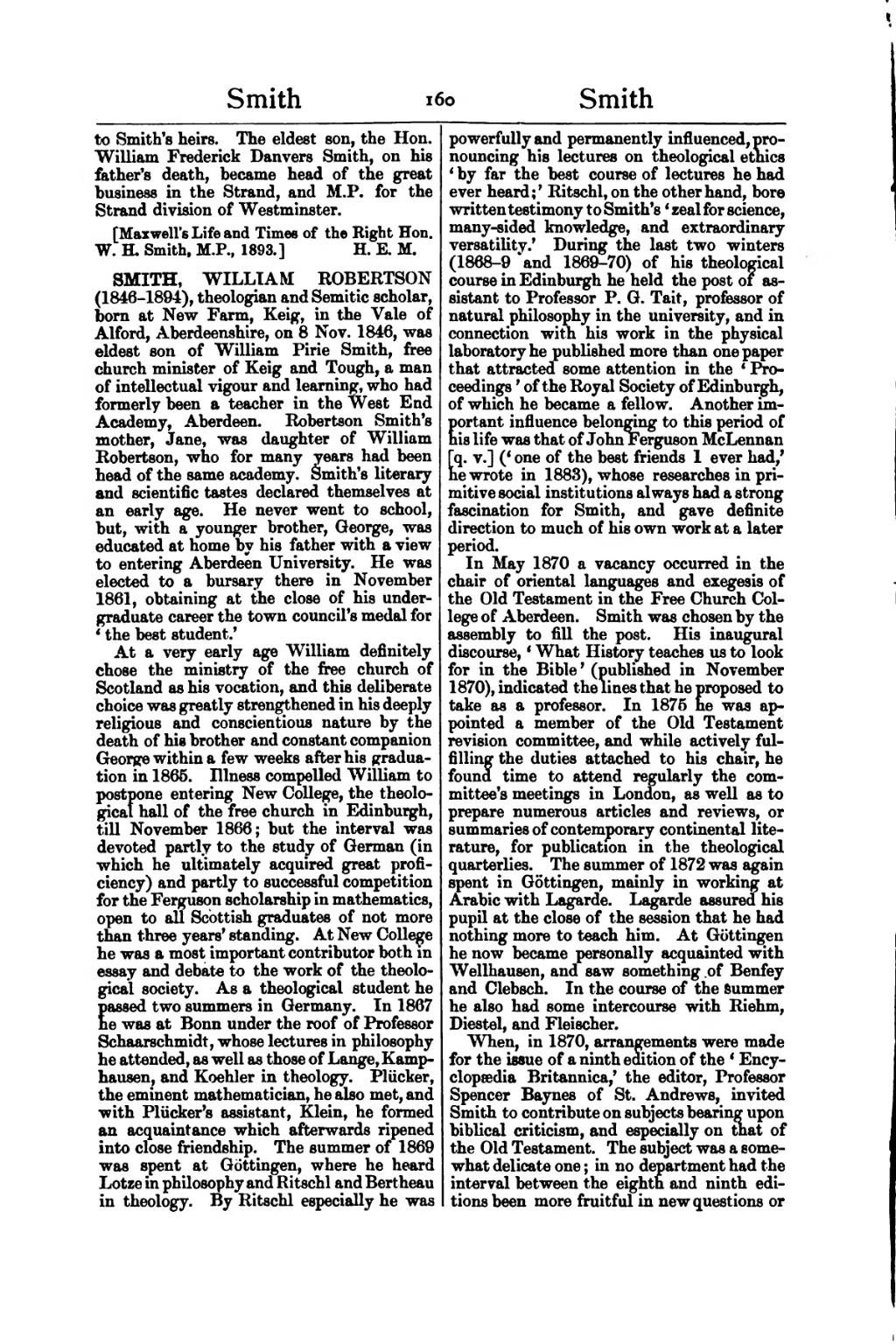to Smith's heirs. The eldest son, the Hon. William Frederick Danvers Smith, on his father's death, became head of the great business in the Strand, and M.P. for the Strand division of Westminster.
[Maxwell's Life and Times of the Right Hon. W. H. Smith, M.P., 1893.]
SMITH, WILLIAM ROBERTSON (1846–1894), theologian and Semitic scholar, born at New Farm, Keig, in the Vale of Alford, Aberdeenshire, on 8 Nov. 1846, was eldest son of William Pirie Smith, free church minister of Keig and Tough, a man of intellectual vigour and learning, who had formerly been a teacher in the West End Academy, Aberdeen. Robertson Smith's mother, Jane, was daughter of William Robertson, who for many years had been head of the same academy. Smith's literary and scientific tastes declared themselves at an early age. He never went to school, but, with a younger brother, George, was educated at home by his father with a view to entering Aberdeen University. He was elected to a bursary there in November 1861, obtaining at the close of his undergraduate career the town council's medal for ‘the best student.’
At a very early age William definitely chose the ministry of the free church of Scotland as his vocation, and this deliberate choice was greatly strengthened in his deeply religious and conscientious nature by the death of his brother and constant companion George within a few weeks after his graduation in 1865. Illness compelled William to postpone entering New College, the theological hall of the free church in Edinburgh, till November 1866; but the interval was devoted partly to the study of German (in which he ultimately acquired great proficiency) and partly to successful competition for the Ferguson scholarship in mathematics, open to all Scottish graduates of not more than three years' standing. At New College he was a most important contributor both in essay and debate to the work of the theological society. As a theological student he passed two summers in Germany. In 1867 he was at Bonn under the roof of Professor Schaarschmidt, whose lectures in philosophy he attended, as well as those of Lange, Kamphausen, and Koehler in theology. Plücker, the eminent mathematician, he also met, and with Plücker's assistant, Klein, he formed an acquaintance which afterwards ripened into close friendship. The summer of 1869 was spent at Göttingen, where he heard Lotze in philosophy and Ritschl and Bertheau in theology. By Ritschl especially he was powerfully and permanently influenced, pronouncing his lectures on theological ethics ‘by far the best course of lectures he had ever heard;’ Ritschl, on the other hand, bore written testimony to Smith's ‘zeal for science, many-sided knowledge, and extraordinary versatility.’ During the last two winters (1868–9 and 1869–70) of his theological course in Edinburgh he held the post of assistant to Professor P. G. Tait, professor of natural philosophy in the university, and in connection with his work in the physical laboratory he published more than one paper that attracted some attention in the ‘Proceedings’ of the Royal Society of Edinburgh, of which he became a fellow. Another important influence belonging to this period of his life was that of John Ferguson McLennan [q. v.] (‘one of the best friends I ever had,’ he wrote in 1883), whose researches in primitive social institutions always had a strong fascination for Smith, and gave definite direction to much of his own work at a later period.
In May 1870 a vacancy occurred in the chair of oriental languages and exegesis of the Old Testament in the Free Church College of Aberdeen. Smith was chosen by the assembly to fill the post. His inaugural discourse, ‘What History teaches us to look for in the Bible’ (published in November 1870), indicated the lines that he proposed to take as a professor. In 1875 he was appointed a member of the Old Testament revision committee, and while actively fulfilling the duties attached to his chair, he found time to attend regularly the committee's meetings in London, as well as to prepare numerous articles and reviews, or summaries of contemporary continental literature, for publication in the theological quarterlies. The summer of 1872 was again spent in Göttingen, mainly in working at Arabic with Lagarde. Lagarde assured his pupil at the close of the session that he had nothing more to teach him. At Göttingen he now became personally acquainted with Wellhausen, and saw something of Benfey and Clebsch. In the course of the summer he also had some intercourse with Riehm, Diestel, and Fleischer.
When, in 1870, arrangements were made for the issue of a ninth edition of the ‘Encyclopædia Britannica,’ the editor, Professor Spencer Baynes of St. Andrews, invited Smith to contribute on subjects bearing upon biblical criticism, and especially on that of the Old Testament. The subject was a somewhat delicate one; in no department had the interval between the eighth and ninth editions been more fruitful in new questions or
